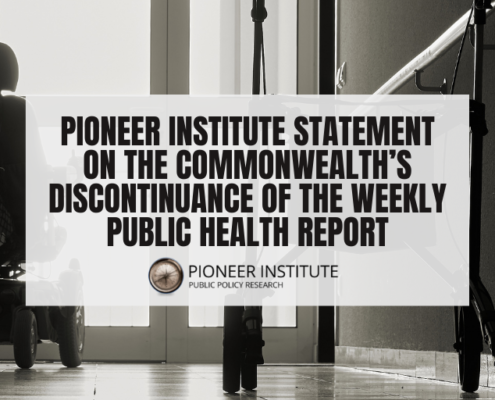Study Applauds State Decision To Let Healthcare Spending Benchmark Decrease
Calls on policy makers to continue pursuing efforts to trim healthcare spending
BOSTON – A new Pioneer Institute Policy Brief applauds the decision by the Commonwealth’s Health Policy Commission to allow the benchmark for increases in the overall rate of healthcare spending to decrease this year, but urges state policy makers to remain focused on the larger culture changes that will be needed to rein in healthcare costs.
“It’s important to keep our cost control expectations high,” said Pioneer Senior Fellow in Healthcare Barbara Anthony, who coauthored “Lowering the Healthcare Cost Growth Benchmark” with Scott Haller. “But we must stay focused on the larger factors that drive healthcare costs.”
Haller and Anthony urge the commonwealth to carefully study the performance of providers and payers in terms of their adoption of payment reform measures, such as of alternative payment methodologies (APMs), and to continue to pursue other approaches to reducing costs such as providing consumers with incentives to use lower-cost, high-quality providers. “The impetus behind Ch. 224 was that payment reform would bring about efficiencies and cost savings. It’s time to ask providers and payers: Where’s the beef?” Anthony added.
Traditional fee-for-service payment arrangements offer incentives for providers to increase profits by conducting more tests and other medical procedures.
Chapter 224 of the Acts of 2012 was designed to control healthcare costs by encouraging the adoption of payment reform measures under which providers assume some or all of the financial risk associated with providing health care services and are rewarded for quality outcomes. Since the provider assumes financial risk, there is an incentive to hold costs down while striving for good patient results. Transparency provisions that make it easier for consumers to access cost and quality information were designed to ensure that quality is maintained.
Through last year, the spending benchmark included in Chapter 224 was pegged to the projected annual growth in gross state product (GSP), which has been forecast at 3.6 percent since 2013. At 2.4 percent, growth in consumer healthcare spending was below benchmark in 2013, but it rose to 4.2 percent and 4.1 percent respectively in 2014 and 2015.
This year the benchmark was slated to drop to half a percentage point below projected GSP growth. The Health Policy Commission could have delayed the decrease, but it chose not to do so.
About the Authors:
Barbara Anthony, a lawyer, is a senior fellow in healthcare at Pioneer Institute focusing on healthcare price and quality transparency. She is also an associate at the Harvard Kennedy School’s Center for Business and Government. She served as Massachusetts Undersecretary for Consumer Affairs and Business Regulation from 2009 to 2015.
Scott Haller graduated from Northeastern University with a Bachelor’s Degree in Political Science. He started working at Pioneer Institute through the Northeastern’s Co-op Program and continues now as the Lovett C. Peters Fellow in Healthcare. He previously worked at the Office of the Inspector General.
Pioneer Institute is an independent, non-partisan, privately funded research organization that seeks to improve the quality of life in Massachusetts through civic discourse and intellectually rigorous, data-driven public policy solutions based on free market principles, individual liberty and responsibility, and the ideal of effective, limited and accountable government.









 This file is licensed under the Creative Commons Attribution 2.0 Generic license.
This file is licensed under the Creative Commons Attribution 2.0 Generic license. 






